Key takeaways:
- Organic cotton is softer and more comfortable than conventional cotton, with a lower environmental impact and increased durability.
- Choosing certified organic cotton (like GOTS or OEKO-TEX) ensures sustainability and ethical practices, enhancing the purchasing experience.
- Integrating organic cotton into daily life can start small, with options like bedding, second-hand clothing, and DIY projects, fostering a deeper connection to sustainable practices.
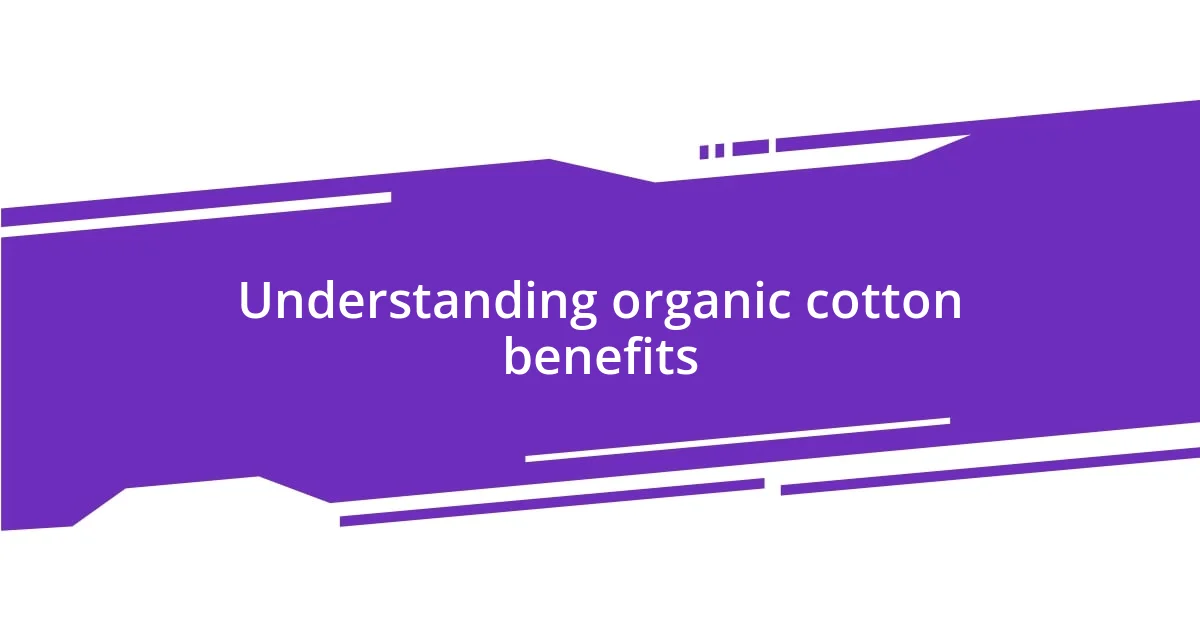
Understanding organic cotton benefits
When I first discovered organic cotton, I was amazed at how much softer it felt compared to conventional cotton. This natural fiber is grown without synthetic pesticides and fertilizers, which means it’s not only gentler on my skin but also better for the environment. Have you ever noticed how certain materials can irritate your skin? With organic cotton, I’ve found the comfort level is significantly higher, making it my go-to choice for everything from T-shirts to bedding.
Another benefit I cherish is the reduced environmental impact. The farming methods for organic cotton promote biodiversity and healthier soil. I often think about the small changes I can make that lead to a cleaner planet, and choosing organic cotton feels like a tangible step. It’s rewarding to know that my purchases support sustainable practices, contributing to a healthier ecosystem.
The durability of organic cotton also surprises me. Despite my initial concerns, I’ve found that my organic cotton items hold up remarkably well in the wash. This longevity not only means fewer replacements but also a reduced carbon footprint over time. How satisfying is it to invest in pieces that last longer? Each time I reach for my favorite organic cotton shirt, I’m reminded of the conscious choice I made for sustainability.
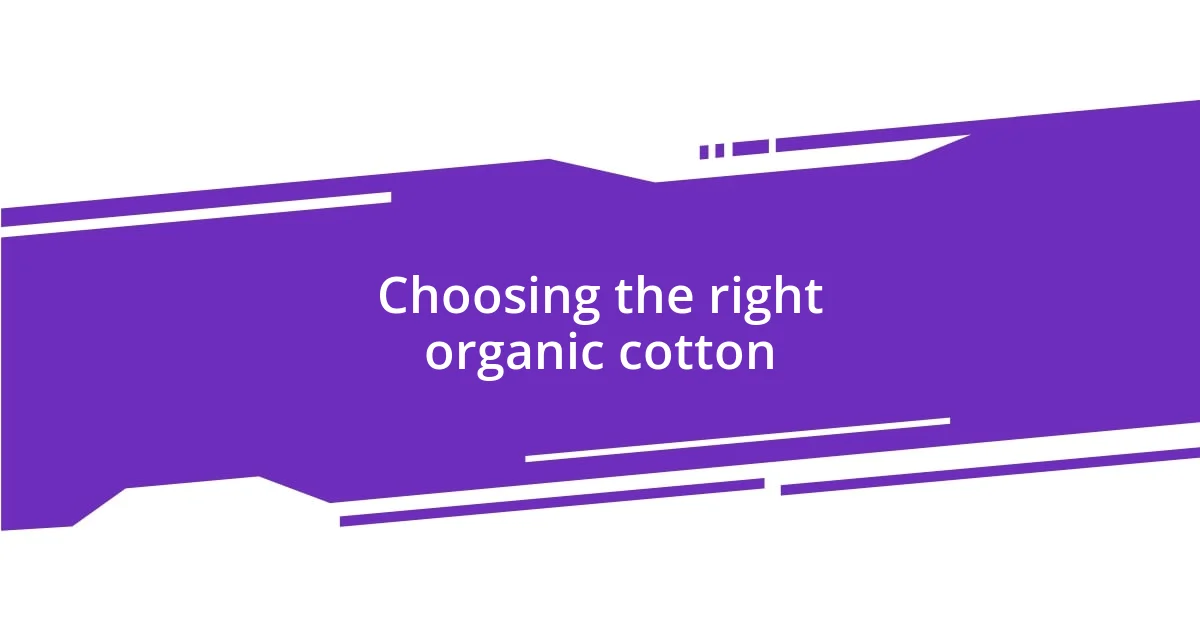
Choosing the right organic cotton
Choosing the right organic cotton can really transform your experience with clothing and home textiles. I’ve learned that not all organic cotton is created equal. Some brands may use quality materials while others cut corners. When I first began my journey with organic fabrics, I was shocked by how various weaves and finishes can drastically change the feel against your skin. It’s all about picking a reputable source and examining the texture to ensure it meets your standards.
Another key point I’ve discovered is the importance of certifications. Certifications like GOTS (Global Organic Textile Standard) or OEKO-TEX indicate transparency in the production process. The first time I spotted these labels, it felt like finding a trusted friend in a crowded room. Having that assurance gives me peace of mind that my choices aren’t just good for me, but for the farmers and ecosystems involved. When I see a product with these certifications, I feel a sense of connection to a larger community that values ethical practices.
Additionally, understanding your specific needs can guide your choice. Are you looking for something breathable for summer or a cozier option for winter? For example, the first organic cotton throw blanket I purchased transformed my living space, adding that perfect layer of warmth and softness on chilly evenings. This kind of thoughtfulness in selecting organic cotton allows you to personalize your experience and enjoy items that genuinely resonate with your lifestyle.
| Type of Organic Cotton | Characteristics |
|---|---|
| GOTS Certified | Meets strict environmental and social criteria; ensures sustainability |
| OEKO-TEX Certified | Tests for harmful substances, ensuring safety for skin contact |
| Conventional Organic | May lack certifications; quality can vary widely |
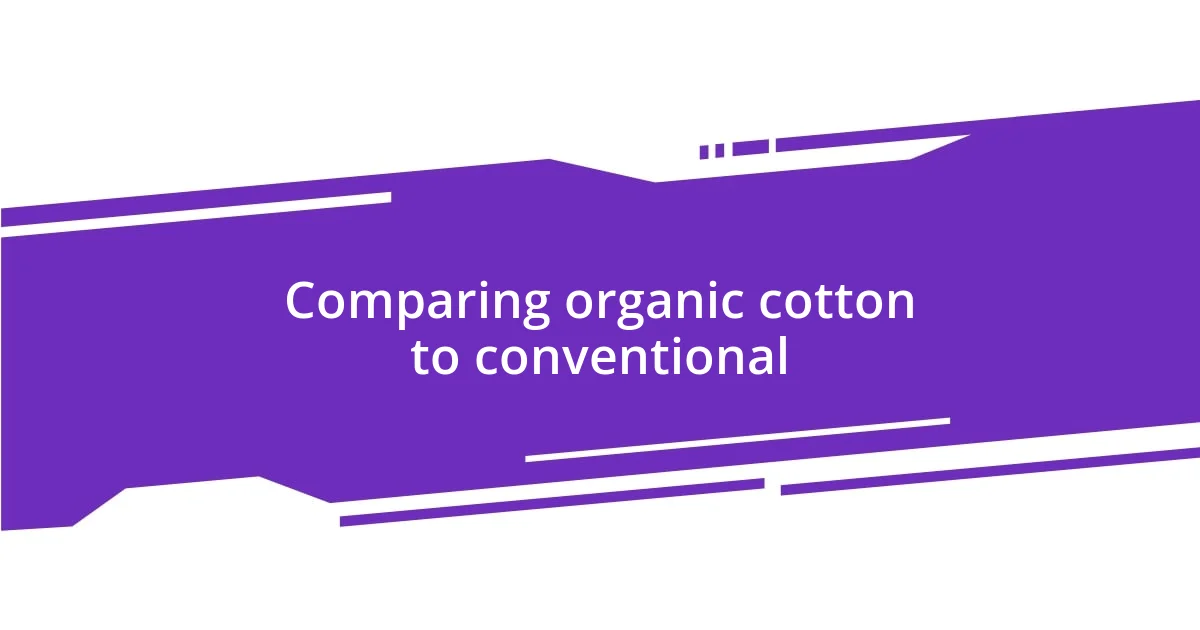
Comparing organic cotton to conventional
Comparing organic cotton to conventional cotton reveals significant differences that truly matter to me. I can’t forget the first time I washed my organic cotton sheets—they felt so vibrant and fresh, while my previous conventional sheets always seemed stiff and dull, no matter how many times I laundered them. The contrast was eye-opening; it’s amazing how the way fabric is produced can affect not only its feel but also its longevity and impact on the planet.
- Pesticide Usage: Conventional cotton farming often relies on harmful chemicals, which can have drastic effects on soil and water quality, whereas organic cotton is grown without synthetic pesticides.
- Water Consumption: Organic cotton typically uses less water than conventional farming practices, tackling a critical environmental concern.
- Health Impact: Many people, including myself, discover that organic cotton has a lower chance of causing skin irritations, which is especially important for those with sensitivities.
When I see the price tag on organic cotton compared to conventional options, I sometimes get a twinge of hesitation. However, I remind myself of the bigger picture. Investing in organic cotton is like choosing to support a healthier planet, plus the comfort it brings is unparalleled. I recall when I opted for a slightly pricier organic cotton shirt; the moment I slipped it on, it felt like wrapping myself in a gentle hug. Knowing I made a choice that aligns with my values adds to that comfort.
- Wearability: Organic cotton provides a softness and breathability that my skin craves, especially during warmer months.
- Sustainability: I’ve experienced peace of mind knowing that organic cotton supports environmentally friendly practices.
- Personal Connection: There’s a unique story behind each organic cotton product, often involving farmers who practice sustainable agriculture, which makes me feel connected to something larger.
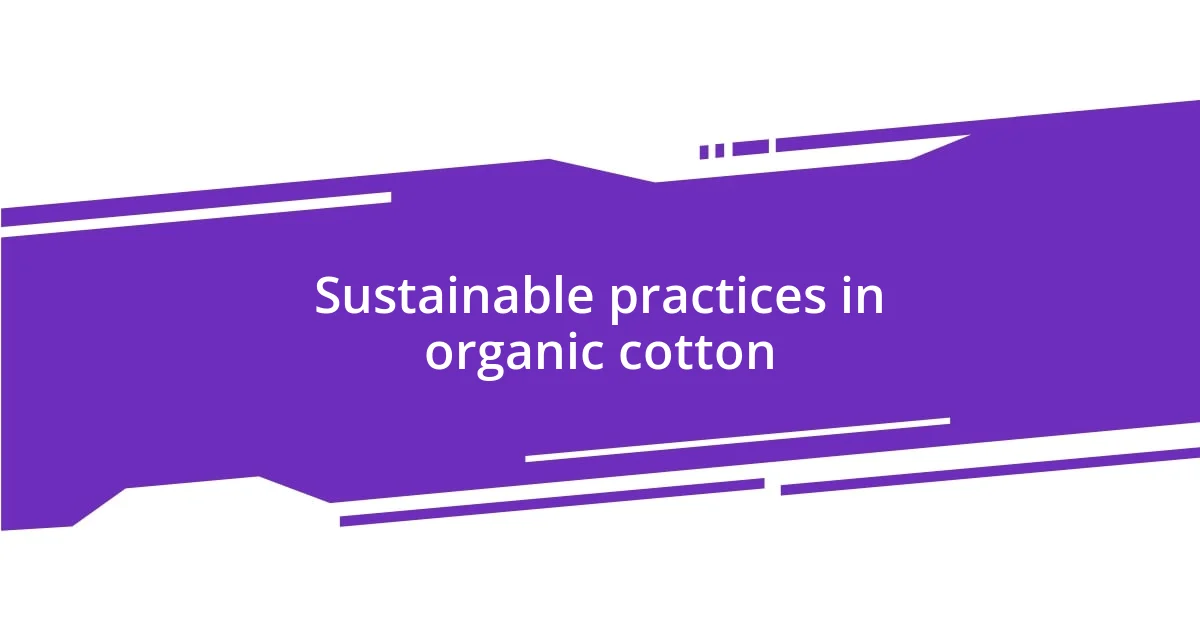
Sustainable practices in organic cotton
Sustainable practices in organic cotton are not just trends; they represent a shift toward a more mindful approach to textile production. I remember learning about crop rotation and how it helps maintain soil health. Initially, I found it fascinating that by alternating the types of crops grown, farmers can naturally enhance nutrient content in the soil without relying on synthetic fertilizers. This small change can have a big impact, contributing to the growth of resilient plants and lower chemical input, which is something I deeply value.
One thing I love is that organic cotton farming often includes using natural pest control methods. I can’t help but reflect on the first time I spotted ladybugs in a cotton field; it made me feel like I was witnessing nature’s own guardians at work. The use of beneficial insects rather than harmful pesticides creates a healthier ecosystem, which not only protects the crops but also benefits surrounding wildlife. Can you imagine how that small act of letting nature do its thing leads to a more sustainable cycle?
I’ve also seen the emphasis on water conservation in organic practices that genuinely resonates with me. I recall reading about how organic cotton farms employ techniques like rainwater harvesting and drip irrigation. These methods ensure that every drop counts, reducing water waste while nurturing the plants. It’s inspiring to know that my purchase choices could champion practices that safeguard precious resources. Wouldn’t it be incredible if sustainable choices became the norm rather than the exception?
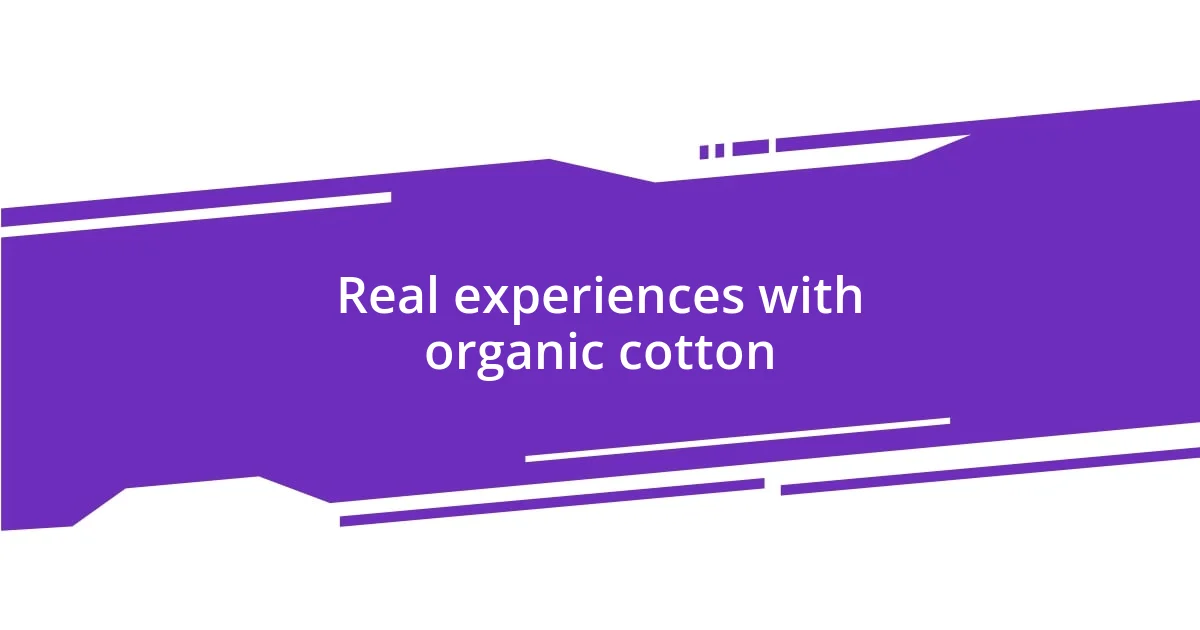
Real experiences with organic cotton
My experiences with organic cotton extend beyond just comfort; they’ve offered me a genuine connection to the earth. I vividly remember unboxing a set of organic cotton towels and being struck not only by their softness but also by the earthy scent—the kind that reminds you of fresh air and open fields. It made me pause and reflect on the journey these textiles took to get to me. What did the farmers experience while cultivating this cotton? Understanding that my choice supports their efforts brings me a deeper sense of satisfaction each time I reach for a towel.
I still chuckle when I think about the first time I wore an organic cotton dress to a summer party. As I moved, the material flowed with such grace, and my friends couldn’t stop complimenting it. In that moment, I realized that choosing organic cotton goes beyond personal comfort; it becomes a conversation starter about sustainability. Have you ever seen someone’s eyes light up when they learn about the benefits of organic farming? It’s like opening a door to a whole new world of conscious choices.
One of my more emotional experiences with organic cotton happened during a shopping trip. I stumbled upon a local store that showcased clothing made from organic cotton, often sourced from nearby farms. Each label shared the story of a family that farmed the cotton, making my heart swell with pride. I couldn’t help but buy a couple of pieces—not just for their beauty, but for the stories they told. Isn’t it amazing to think that every time I wear those clothes, I’m not only embracing comfort but also advocating for sustainable practices and supporting real people who value the earth?
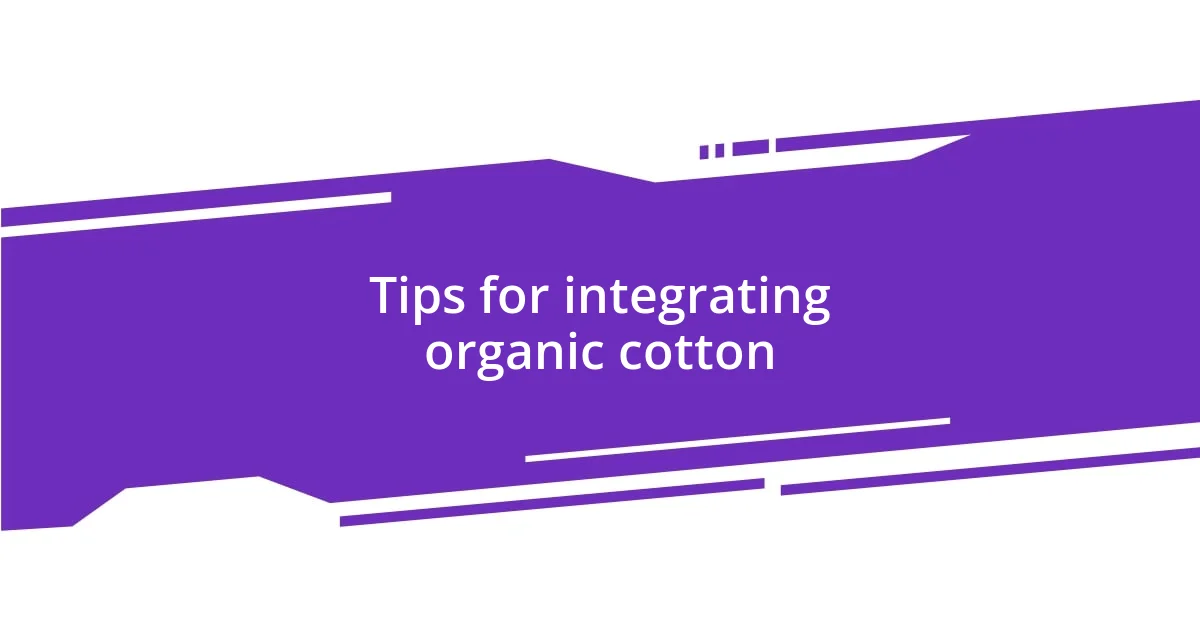
Tips for integrating organic cotton
Thinking about incorporating organic cotton into your life? I’ve found that starting small can make a big difference. For instance, when I decided to replace my usual cotton bedsheets with organic options, the transformation was impressive. I remember the first night; the cool, breathable fabric made me feel as if I was sleeping under a blanket of nature itself. What a comforting thought, knowing that my choice supported eco-friendly practices!
When it comes to clothing, I highly recommend exploring second-hand organic cotton garments. I once discovered a lovely vintage organic cotton shirt while thrifting, and it felt like a hidden treasure. Not only did I get a unique piece, but I was also embracing a sustainable cycle by giving it a second life. Have you ever considered the stories behind pre-loved items? Each worn seam has its own narrative, which adds an extra layer of connection to my wardrobe.
Lastly, experimenting with DIY projects can beautifully integrate organic cotton into your home. I’ve had so much fun creating my own organic cotton reusable shopping bags. It’s surprisingly easy, and the satisfaction of making something with my own hands is immensely rewarding. Plus, those bags spark conversations when I’m out shopping — it’s a great way to share the beauty of sustainable practices with others. Isn’t it wonderful how simple changes can lead to meaningful discussions about our planet’s future?














